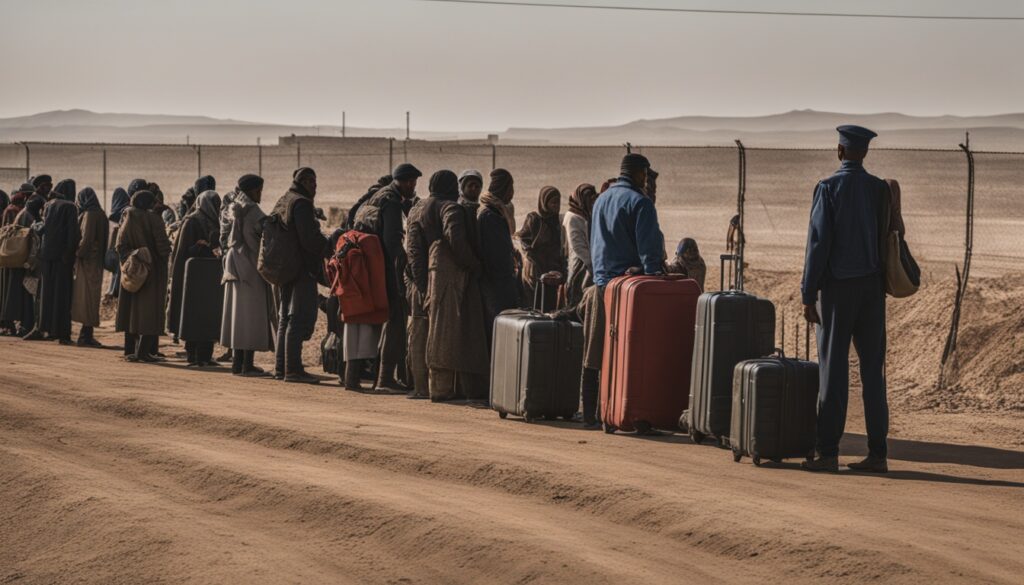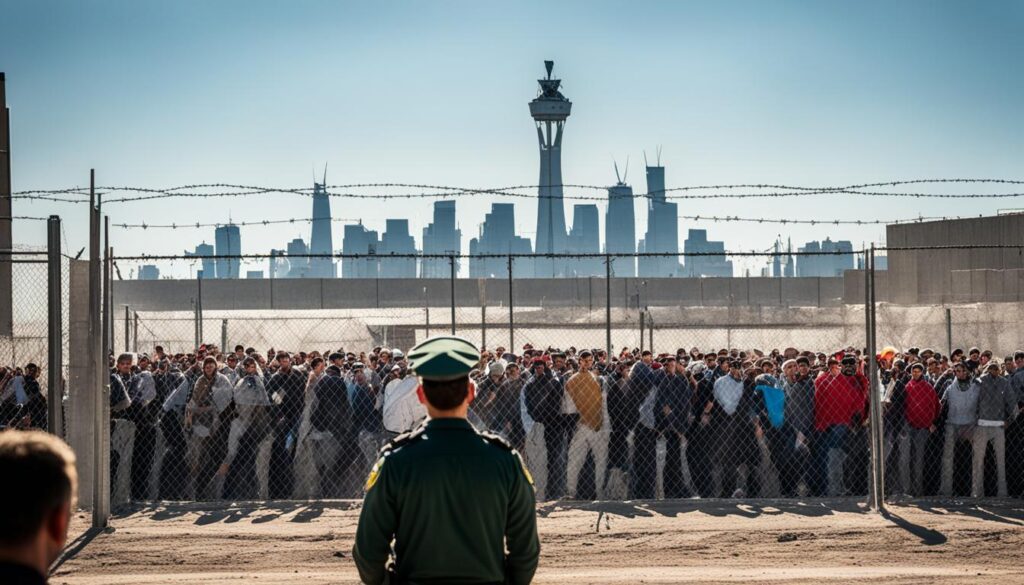Last Updated on: 2nd February 2025, 03:52 pm
Immigration has long been an essential aspect of human history, facilitating cultural exchange and economic growth. However, today, some countries present significant barriers to immigration, making it exceedingly challenging for prospective immigrants. Among the challenging immigration destinations, nations like the United States, Switzerland, and Japan are notable for their demanding immigration procedures and policies.
For instance, only citizens of around 40 countries can enter the United States without a visa, and even those from visa-waiver countries must pay $21 and obtain ESTA pre-clearance1. Moreover, the United States had around 12.7 million legal permanent residents as of January 1, 20232, illustrating its rigorous entry and residency requirements.
On the other hand, Japan requires individuals to have resided in the country for five years before being eligible for citizenship2. Adding to the complexity is Switzerland, which requires applicants to live in the country for at least five years to qualify for both permanent residency and citizenship2. These stringent yet systematic barriers emphasize the layers of challenges faced by immigrants.
Key Takeaways
-
- The United States only allows visa-free entry to citizens of about 40 countries1.
- Austria mandates a continuous residence of 10 years before applying for citizenship2.
- Japan requires a five-year residency for citizenship eligibility2.
- Switzerland’s residency requirement for citizenship is also set at five years2.
- The United States received 51 million migrants in 2023, making it the most favored destination3.
Contact us if you are Interested in Buying Property Abroad!
Introduction to Global Immigration Challenges
Global immigration is one of the most pressing issues faced by countries today. With approximately 184 million people residing outside their country of citizenship, which accounts for 2.3% of the global population, human mobility has increased significantly, presenting numerous challenges and complexities4.
The Complexity of Immigration Policies
Immigration policies vary significantly around the world, reflecting a myriad of economic, social, political, and security considerations. Stringent immigration policies are often designed to control who gains entry into a country and under what conditions. The diversity in citizenship acquisition methods, such as blood relation, birthplace, marriage, and naturalization, contributes to the global immigration policies complexities4. For instance, China’s naturalization process requires a “legitimate reason” for acceptance, while some countries offer an “investment visa” requiring significant financial contributions4.
Effective policy-making in both origin and destination countries is crucial to manage and harness the potential of global migration to benefit both sides4.
Impact on Prospective Immigrants
Prospective immigrants often face numerous hurdles due to these stringent immigration policies. High-income countries, which are aging, demand skilled young workers from lower-income countries but maintain restrictive policies that complicate the migration process4. Countries like the United States, for instance, have been known for their unwelcoming stance at borders, posing significant challenges for migrants worldwide5. Conversely, Singapore’s successful model of embracing a multicultural approach demonstrates the potential benefits of a more inclusive policy.
Understanding Stringent Immigration Policies

The governing strategies of hard-to-enter countries often include stringent laws influenced by diverse factors such as security priorities, economic tactics, cultural preservation, and demographic goals. The immigration policy factors result in multifaceted paths to residency and citizenship, such as naturalization, marriage, bloodline, and business investments, each presenting unique challenges.
Factors Influencing Tough Immigration Laws
Security concerns heavily shape the tough immigration laws of many nations. For instance, European Union members have implemented restrictive measures to manage labor market participation by newcomers from recently joined states like Croatia, Romania, and Bulgaria6. Economic strategies also play a crucial role; countries set high bars for business investments to attract affluent and skilled migrants, ensuring that newcomers contribute significantly to the economy. Cultural preservation is another essential factor; stringent laws influentials in Japan’s immigration system are designed to maintain the country’s cultural homogeneity, resulting in the acceptance of only six out of 3,777 refugee applicants in 20137.
Countries with the Most Rigorous Screening Processes
Several countries are renowned for their rigorous screening processes, reflecting their nuanced immigration policy factors. Qatar and Liechtenstein, for instance, have highly selective naturalization procedures with enforceable quotas. Qatar’s long-term residency requirements are notably thorough, requiring applicants to demonstrate continuous residence, significant financial investments, and linguistic proficiency. Similarly, Japan’s specified skilled worker program attracted fewer than 3,000 applicants, despite an annual goal to attract 40,000 overseas workers7. The arduous naturalization processes and stringent laws influentials underscore these nations’ prioritization of stringent immigration policies.
Moreover, the demographic aims of hard-to-enter countries manifest in their meticulous selection processes. Western European nations witnessed a significant rise in their foreign-born workforce from 12.8% to 16.2% between 2010 and 2019, a trend similarly observed in the United States6. These countries leverage rigorous screening to ensure that immigration aligns with their long-term demographic and economic objectives.
Immigration Difficulties in the United States

Navigating the labyrinthine routes towards permanent residency or citizenship in the U.S. can be particularly daunting. The nation is permitted to issue up to 675,000 permanent immigrant visas annually across various categories, including family-based and employment-based visas8. Nonetheless, US immigration challenges are manifold, spanning strict visa requirements and the naturalization process difficulties. These obstacles are further complicated by shifting political climates, affecting immigrant perceptions and policies.
Stringent Visa Requirements
The United States implements stringent visa requirements, which can be especially challenging for prospective immigrants from non-visa-waiver countries9. There are more than 20 types of visas for temporary nonimmigrant workers, making the process intricate and time-consuming8. Moreover, humanitarian protections such as asylum and Temporary Protected Status come with their own set of limitations, even though they have no numerical caps8. Efforts to pass comprehensive immigration reform remain in stalemate, exacerbating the complexity of the visa acquisition process.
Naturalization Process Obstacles
The naturalization process involves multiple hurdles, including mandatory interviews, tests, and allegiance pledges. In the last decade, USCIS welcomed over 7.7 million naturalized citizens9. In FY 2023 alone, 878,500 new citizens were naturalized9. However, intricate paperwork and the complexities of meeting various eligibility criteria often pose significant challenges. Notably, 32% of the newly naturalized citizens in FY 2023 hailed from the top five countries, which included Mexico and India9. Despite 95.3% of applicants eventually passing the naturalization test, the journey to achieving citizenship remains arduous.
Impact of Political Climate on Immigration
The political climate significantly impacts US immigration challenges. For instance, changes in administration often result in fluctuating immigration policies. The last few years have seen increased security measures, like the construction of a 700-mile border fence along the US-Mexico border10. Politics interplay with public sentiment, influencing the reception that immigrants receive and shaping how welcoming—or unwelcoming—US borders appear to potential migrants. This ebb and flow of political influence yields a limiting environment for both temporary and permanent immigration avenues.
By understanding these multifaceted challenges, ranging from strict visa requirements to the intricacies of the naturalization process and the turbulent political climate, stakeholders can better navigate the treacherous waters of the U.S. immigration system.
Challenges of Immigrating to China

Gaining citizenship in China presents numerous challenges, especially in comparison with other East-Asian countries, marking significant China immigration obstacles for those seeking naturalization. The naturalization process in China is arduous, with strict guidelines and limited pathways available for foreign nationals.
Naturalization Process
The naturalization procedure challenges begin with the basics: having Chinese relatives, possessing permanent residency, or demonstrating a convincing reason for citizenship application. The regulations emphasize selective eligibility criteria that many find difficult to satisfy. Statistical data from China’s 2020 census reveal an exceptionally low number of naturalized citizens, illustrating the difficulties foreign nationals face in this process11. By mid-2023, the migrant population without local household registration was about 376 million, complicated further by the stringent hukou system, although there have been gradual steps toward its abolition to facilitate better urban integration11.
Limitations and Constraints
China’s immigration framework imposes notable citizenship constraints on prospective immigrants. As of 2017, China had approximately one million foreigners, which is a mere 0.1% of the total population12. Despite recent attempts to attract high-level foreign professionals through programs like the Thousand Talents Program, the naturalization numbers remain negligible compared to the general population growth13. Furthermore, surveys indicate that just over half of respondents believe immigration benefits China’s development, but a significant proportion still prioritize stricter control over who can settle and become citizens of China12. By 2040, over a quarter of China’s population is projected to be aged over 60, intensifying the necessity for stable and effective immigration policies to sustain the workforce11.
Contact us if you are Interested in Buying Property Abroad!
Complex Procedures in Japan

Japan’s rigorous immigration system presents notable challenges for prospective immigrants. The demanding naturalization requirements include a minimum five-year residency and an exhaustive review process that often extends beyond statutory guidelines. The complexity is compounded by the rapid decline in Japan’s population and a contracting labor force, projected to reduce by 10% over the next 25 years and decrease by 21.6 million people in 50 years14. These factors underscore the Japan immigration complexities and the necessity for a streamlined approach.
Naturalization Requirements
Demanding naturalization requirements present a significant hurdle. Applicants must reside continuously in Japan for at least five years, demonstrate good conduct, and have financial stability. Additionally, less than 3% of Japan’s total population comprises foreign nationals, despite over 3 million foreign nationals having resided there by the end of 202215. The stringent Japan immigration complexities make the naturalization process challenging.
Nikkei Law Implementation
The Nikkei Law impact illustrates Japan’s nuanced approach to immigration and integration policies. Introduced to support Latin American immigrants of Japanese descent, this law offers repatriation assistance but also reflects Japan’s cautious stance on increasing its foreign population. Furthermore, Japan must import over 600,000 immigrants annually to maintain its workforce, or face a potential 6.7% drop in GDP each year14. While the Nikkei Law provides opportunities for specific groups, broader Japanese immigration policies remain restrictive.
In conclusion, the complexities of Japan’s immigration procedures, coupled with stringent demanding naturalization requirements and targeted policies such as the Nikkei Law, make Japan one of the most challenging countries to immigrate to in 2025.
Stringent Regulations in Qatar

The state of Qatar is known for its particularly stringent immigration regulations, marked by complex residency criteria and strict quotas. Qatar requires expatriates to reside in the country continuously for a minimum of 25 years to be eligible for citizenship16. Dual citizenship is not permitted, and applicants must demonstrate knowledge of the Arabic language, good conduct, and financial resources16. These measures form significant Qatar immigration barriers for those aspiring to settle in the nation.
Long-Term Residency Requirements
Expatriates in Qatar must work for their employer for at least two years before they can transfer their sponsorship17. Additionally, the naturalization process is highly stringent, requiring 25 years of continuous residence16. Applicants must also have a clear legal record and possibly convert to Islam. Such residency criteria reflect the rigorous nature of Qatar’s immigration policies, deterring many potential immigrants from seeking citizenship.
Naturalization Quotas
The naturalization process in Qatar is further complicated by strict quota limitations. The state limits the number of individuals who can be naturalized annually, making it one of the most restrictive in the world16. These quotas ensure that only a minimal number of expatriates gain citizenship each year, preserving a distinct separation between native Qataris and naturalized citizens. This tiered approach to citizenship rights and benefits underscores the significant hurdles involved in becoming a Qatari national17.
Hardest Countries To Immigrate To: Switzerland

Switzerland is renowned for having some of the toughest immigration requirements, making it a challenging destination for prospective immigrants. One of the key hurdles in this process revolves around Switzerland’s long-term residency constraints and their demanding criteria for cultural integration.
Long-Term Residency Constraints
Securing long-term residency in Switzerland is often an arduous journey, marked by stringent regulations and extensive requirements. For EU nationals, the U.S., Canada, and other EFTA countries, obtaining a C permit mandates a five-year stay, whereas for others, this period extends to ten years. This extended timeline underscores the residency limitations that many face when aiming for permanency in Switzerland18. Moreover, applicants must consistently demonstrate their integration into Swiss society and their adherence to Swiss values, further amplifying the complexities of attaining long-term residency. This rigorous assessment reflects Switzerland’s dedication to cultural congruity and national security.
Strict Language and Culture Tests
Meeting the language and cultural integration challenges is another significant aspect of the immigration process in Switzerland. Prospective immigrants are expected to pass strict tests that evaluate their proficiency in one of the national languages—German, French, Italian, or Romansh. The requirement to demonstrate language skills and cultural understanding is pivotal in ensuring that new residents can fully integrate and contribute to the community.
Furthermore, the integration tests are designed to assess applicants’ knowledge of Swiss customs, political system, and societal values. This thorough examination process ensures that only those who meet Switzerland’s toughest immigration requirements and show a genuine dedication to the country’s cultural heritage can succeed in acquiring residency19.
| Requirement | Details |
|---|---|
| Residency Period | 5 years for EU, U.S., Canada, EFTA; 10 years for others |
| Language Proficiency | German, French, Italian, or Romansh |
| Integration Tests | Knowledge of Swiss customs, political system, societal values |
These long-term residency constraints combined with strict language and cultural integration challenges make Switzerland one of the hardest countries to immigrate to, emphasizing a meticulous and deliberate approach in their immigration policies.
Vatican City: Unique Immigration Challenges

The Vatican City presents a set of distinct challenges when it comes to immigration. Known for its Vatican City immigration uniqueness, this smallest sovereign state in the world is highly selective about granting citizenship, which is one of the most scarce citizenship options globally.
Limited Citizenship Pathways
Citizenship in Vatican City is extremely rare and is typically confined to individuals serving in specific roles. These include Catholic Cardinals, Vatican diplomats, selected church officials, and members of the Swiss Guard. This policy underscores the Vatican City immigration uniqueness, as the right to reside here depends heavily on fulfilling particular professional duties. According to the Dicastery for Promoting Integral Human Development, citizenship is tied to the professional roles within the state and is forfeited upon leaving said roles20. This limitation effectively restricts long-term residence, making Vatican City one of the harder places to establish a permanent home.
Special Permissions and Requirements
For those outside these exclusive categories, acquiring permission to reside in Vatican City necessitates special permissions. These permissions are hard to come by and usually involve specific diplomatic or ecclesiastical responsibilities. The Catholic Church’s Migrants & Refugees Section focuses on aiding displaced people worldwide, emphasizing international cooperation and solidarity20. Their mandate includes promoting safe and legal channels for all migrants and refugees by protecting their rights and dignity, which aligns with Vatican City’s rigorous, yet dignified approach to immigration policies20.
Moreover, the M&R Section operates in collaborative efforts with various partners, including Bishops’ Conferences and international organizations, to ensure the practical implementation of its principles worldwide. This commitment reflects Vatican City’s broader ethos toward migration and immigration20. Despite its stringent policies, the Vatican is exemplary in advocating for humane treatment and protection for labor migrants20.
The Rigorous Process in Kuwait
The path to citizenship in Kuwait is undoubtedly one of the most stringent globally, with the country imposing robust language and religious criteria alongside marriage-based citizenship opportunities. This adds to the broader picture of Kuwait immigration hurdles that many prospective immigrants face. To become a Kuwaiti citizen, applicants must generally have resided in the country for at least 20 years. This period is reduced to 15 years for citizens of other Arab nations or foreign-born wives of Kuwaiti men21. Additionally, naturalization candidates must be able to demonstrate fluency in Arabic as well as a firm adherence to the Islamic faith22.
Language and Religious Criteria
The language proficiency demands are substantial, necessitating applicants to exhibit functional fluency in Arabic. This requirement demonstrates Kuwait’s intention to ensure that new citizens can integrate effectively into its predominantly Arabic-speaking society. Furthermore, adherence to Islam is a critical component of the naturalization process. Converts to Islam must have practiced the religion for a minimum of five years, underscoring the emphasis on genuine religious commitment.
Marital Path to Citizenship
Marriage is a significant pathway to Kuwaiti citizenship, particularly for foreign women married to Kuwaiti men. These women can apply for citizenship after 15 years of marriage, making it a slightly more accessible route compared to the standard 20-year residence requirement for most other individuals21. This method not only facilitates familial unity but also helps women integrate into Kuwaiti society effectively. Engaging with these processes highlights the marriage-based citizenship opportunities, albeit within a framework of stringent conditions.
Contact us if you are Interested in Buying Property Abroad!
FAQ
What are some of the hardest countries to immigrate to in 2024?
Why are some countries considered challenging immigration destinations?
What factors influence the toughest countries for migrants?
How do stringent immigration policies affect prospective immigrants?
What are some of the most common immigration challenges in the United States?
What makes the process of gaining citizenship in China difficult?
Why is Japan's naturalization process considered complex?
What are the primary immigration challenges in Qatar?
What makes Switzerland one of the hardest countries to immigrate to?
What unique immigration challenges exist in Vatican City?
How does Kuwait's immigration process impose hurdles on prospective migrants?
Source Links
- https://nomadcapitalist.com/global-citizen/cuuna-hardest-countries-immigrate/
- https://www.investopedia.com/articles/personal-finance/121114/5-hardest-countries-getting-citizenship.asp
- https://www.topics.plusrelocation.com/post/102j7j4/the-worst-countries-to-move-to-in-2024
- https://www.worldbank.org/en/news/feature/2023/12/11/global-migration-in-the-21st-century-navigating-the-impact-of-climate-change-conflict-and-demographic-shifts
- https://www.icrc.org/en/document/speech-migration-and-internal-displacement-national-and-global-challenges
- https://finance.yahoo.com/news/15-hardest-countries-citizenship-europe-225939529.html
- https://en.wikipedia.org/wiki/Immigration_by_country
- https://www.americanimmigrationcouncil.org/research/how-united-states-immigration-system-works
- https://www.uscis.gov/citizenship-resource-center/naturalization-statistics
- https://www.iom.int/countries/united-states-america
- https://www.ispionline.it/en/publication/why-isnt-china-considering-immigration-against-demographic-decline-163101
- https://thediplomat.com/2020/12/chinese-attitudes-toward-immigrants-emerging-divided-views/
- https://www.merics.org/en/report/how-immigration-shaping-chinese-society
- https://migration.ucdavis.edu/rs/more.php?id=39
- https://www.expatica.com/jp/move/immigration/japan-visa-79399/
- https://visitukraine.today/blog/2637/hardest-countries-to-get-citizenship-in-the-world-2023
- https://gulfmigration.grc.net/media/pubs/exno/GLMM_EN_2016_01.pdf.pdf
- https://finance.yahoo.com/news/18-hardest-countries-citizenship-2023-093534037.html
- https://legamart.com/articles/4-easiest-countries-to-immigrate-to/
- https://icmc.net/future-of-work/report/03-vatican-section
- https://worldpopulationreview.com/country-rankings/hardest-countries-to-immigrate-to
- https://visaguide.world/tips/hardest-countries-to-immigrate-to/
Best Countries According to Aparthotel.com
- Best Countries To Live In Europe
- Best Countries To Move To From Canada
- Best Country To Live In
- Top Birth Tourism Countries
- Cheapest Asian Country To Live In
- Cleanest Country In The World
- Countries With No Capital Gains Tax
- Countries That Allow Dual Citizenship
- Countries With No Income Tax
- Countries With No Inheritance Tax
- Countries With No Property Tax
- Easiest Countries To Move To From USA
- Easiest EU Country To Get Citizenship
- Hardest Countries To Immigrate To
- Highest Tax Paying Country
- Instant Citizenship Countries
- Least Corrupt African Countries
- Lowest Tax Countries
- Non Extradition Countries
- Safest Countries In Africa
- Safest Countries In Europe
- Safest Country In Asia
- Safest Country In The World
- Safest Latin American Countries
- Second Passport Countries
- Territorial Tax Countries
- Which Country Pays Highest Salary
- Most LGBT Friendly Countries
- Best Countries For Expats
- Best Countries for Work-Life Balance
- The Best Countries For Hiking Adventures
- Best Countries for Expat Healthcare
- Safest Countries For Women Travelers
- The Best Country For Safari Adventures
- Top Solo Travel Destinations for Adventure Seekers
- The Best Solo Trips For Women
- Best Countries For Disabled Veterans
- Top Countries for Plastic Surgery
- Top Countries for All Inclusive Resort Vacations
- Top Countries With The Best Food Worldwide
- Best Countries For Black Expats
- Top Countries for Education
- Best Places To Retire In The World
- Top Countries for Transgender Expats to Live
- Best Places For Passport Bros
- Top 10 Best Countries For Surfing
- Top Countries for Digital Nomads
- Top European Countries for English Speakers to Live
- Top Countries for Software Engineers to Thrive

As a passionate, global-thinking Real Estate Investor I am constantly looking for the best opportunities to invest in Properties. With Aparthotel.com I am building an All-In-One Global Real Estate Platform, where people can analyse, rent or invest in properties. Additionally I help Investors with comparing the best financing options as well as give detailed Consultation on the buying process for Real Estate Investments around the world. I am looking forward to sharing my knowledge on this Website and feel free to reach out to me if you have any questions.

Comments